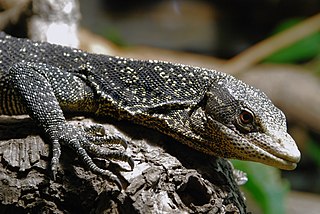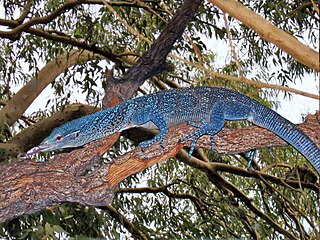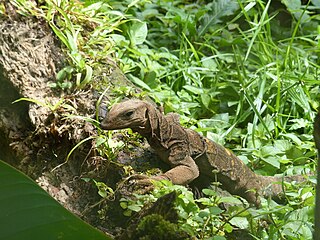
Monitor lizards are large lizards in the genus Varanus. They are native to Africa, Asia, and Oceania, and one species is also found in the Americas as an invasive species. About 80 species are recognized.

The black tree monitor or Beccari's monitor is a species of lizard in the family Varanidae. The species is a relatively small member of the family, growing to about 90–120 cm (35–47 in) in total length. V. beccarii is endemic to the Aru Islands off New Guinea, living in an arboreal habitat. The skin color of adults is completely black, to which one common name refers.

The emerald tree monitor or green tree monitor, is a small to medium-sized arboreal monitor lizard. It is known for its unusual coloration, which consists of shades from green to turquoise, topped with dark, transversedorsal banding. This coloration helps camouflage it in its arboreal habitat. Its color also makes the emerald tree monitor highly prized in both the pet trade and zoos alike.

The golden-spotted tree monitor, also known commonly as the golden speckled tree monitor, is a species of monitor lizard in the family Varanidae. The species is endemic to Waigeo Island in Indonesia.

The peach-throated monitor, also known commonly as the Sepik monitor, is a species of monitor lizard in the family Varanidae. The species is native to New Guinea.
The turquoise monitor is a species of monitor lizards found in Indonesia. Specifically, it is found on Halmahera Island and in the Maluku Islands.

The blue-tailed monitor, blue-tailed tree monitor or Kalabeck's monitor, is a monitor lizard of the Varanidae family. It belongs to the V. doreanus group of the subgenus Euprepiosaurus.
The sago monitor or torch monitor, Varanus obor, is a species of monitor lizards endemic to the Indonesian island of Sanana.
The canopy goanna, Keith Horne's monitor, blue-nosed tree monitor, or Nesbit River monitor is a species of monitor lizards native to northeast Australia. It is a member of the Varanus prasinus species group.
Finsch's monitor is a species of monitor lizard in the family Varanidae. The species is found in New Guinea and Australia.
The Rennell Island monitor is a species of monitor lizards found in the Solomon Islands archipelago. It is also known as the Hakoi Monitor. It belongs to the subgenus Euprepiosaurus along with the canopy goanna, the peach-throated monitor, Kalabeck's monitor, and others.

Varanus kordensis, the Biak tree monitor, is a member of the Varanidae family found on Biak Island in Indonesia. It is also known as the Kordo tree monitor. Long considered a subspecies of the emerald tree monitor, most authorities now treat it as a separate species.

The Palawan water monitor, Varanus palawanensis, is a quite large species of monitor lizard in the family Varanidae. The species is endemic to the Philippines.

Varanus macraei, the blue-spotted tree monitor or blue tree monitor, is a species of monitor lizard found on the island of Batanta in Indonesia. It is named after herpetologist Duncan R. MacRae, founder of the reptile park Rimba on Bali.
Varanus rainerguentheri, commonly known as Rainer Günther's monitor, is a species of lizard in the family Varanidae. The species is endemic to the Moluccas.

Varanus spinulosus, the Solomon Island spiny monitor, Isabel monitor, or spiny-neck monitor, is a species of monitor lizard. It is endemic to the Solomon Islands archipelago and is also known from Santa Isabel Island, San Jorge Island and Bourgainville Island.

Varanus reisingeri, known commonly as Reisinger's tree monitor and the Yellow tree monitor, is a species of monitor lizard in the family Varanidae. The species is endemic to Indonesia. It was at one point at least considered an allopatric insular subspecies of the green tree monitor, due to physical and genetic similarities.
Bogert's monitor is a species of tree-dwelling lizard in the family Varanidae. The species is native to Papua New Guinea.

Bennett's long-tailed monitor is a species of monitor lizard in the family Varanidae. It is found in Palau, the Federated States of Micronesia, and the Northern Mariana Islands.

The subgenus Hapturosaurus, sometimes known as the tree monitors, consists of slender-bodied arboreal monitor lizards mostly found in the tropical rainforests of Indonesia and Papua New Guinea.













